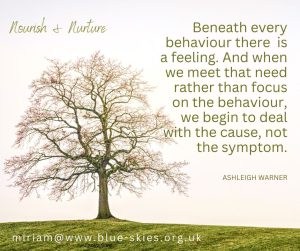Three common mistakes people make about emotions
People often deny their feelings. They don’t just avoid anger and grief, some avoid excitement, love, joy.
This can be due to a false concept of ‘positive’ and ‘negative’ emotions.
Every emotion has its purpose. We should fear them no more than a sneeze or a fart. They are just consequences of being alive.

Unfortunately people
1) Confuse behaviour and feelings and believe the feelings themselves are wrong or immoral – they aren’t (see sneeze reference above);
2) Believe the feelings have to be stopped and so get into behaviours instead of waiting for the feelings to pass, (which happens if you don’t feed them with reactions and drama);
3) Confuse their feelings and believe for example they are feeling angry when it’s actually grief, (becoming more friendly with these inner visitors perhaps by journalling or having therapy will increase self awareness).
Morals -‘It is wrong or dangerous to feel certain feelings’
The rules of society help us live in community, and some rules, about harming others for example, we want to keep. The trouble is that anxiety rises when you break an rule you were given as a child, and your body doesn’t know the difference between the adrenaline that would arise if you broke the training to look right and left when crossing the road or the adrenaline that arises when breaking the rule to not ‘blow your own trumpet’ and experience pride and satisfaction. Adrenaline doesn’t discriminate. Your thinking, not your feeling, is what helps you decide which rules to keep and which you can discard.
Many people do not know the difference between feelings and behaviour. For example, having a violent parent might cause you to mistakenly associate anger with violence. We cannot help our feelings anymore than we can help a burp, a wee, hunger. Feelings of anger, love, disgust and so on are not good feelings or bad feelings, they are feelings.
We over think our feelings and worry about them because people use them as excuses for immoral action. Only behaviour is good or bad, helpful or unhelpful. We need to just let our feelings be.
It’s ok to feel but we need to engage our thinking before choosing how we react if at all.
Thoughtless, knee jerk reactions are generally unhelpful (with a few exceptions such as when we are in immediate danger).
By separating out feeling from thinking you can begin to release the grip of your emotions.
 Avoidance and addiction – ‘I will not cope with my feelings’
Avoidance and addiction – ‘I will not cope with my feelings’
Because intense feelings sometimes lead to behaviours which cause social estrangement or further problems, people become afraid of their own feelings and shut their feelings down. Fear of feeling steers you off course from your true direction and being authentic.
Childhood training such as, ‘don’t cry’ ‘be strong’ ‘don’t make a scene’, all contribute to this fear of feeling emotions. Why would your parents tell you not to do it if it was safe? And if what would they say if they could see you being emotional now?
Trying to get rid of feelings causes more problems.
Primitive survival needs for community and approval were paramount when you were a child (being angry might upset your primary caregiver and lose the affection you needed to survive for example) but if you take them into adult life, the survival habit (need for approval) becomes impossible as you now have to please a hundred people not just one or two! The childhood habit becomes global and restricts your wants and needs.
Addiction to alcohol, food, relationships, order and so on are about addiction to so called ‘positive feelings’ but merely indicate your difficulty with feeling loneliness, hunger and anger.
Feelings cannot be changed but the thoughts we have about them CAN! Beliefs that you need certain things to avoid painful feelings, or that you need control and certainty to get rid of your feelings, these thoughts can be changed.
If we are not afraid of feeling our emotions they cannot control us
Confusion
You may be unconsciously mistaking one feeling for another, where you feel a more ‘acceptable’ feeling, for example crying when you are angry because you cannot acknowledge anger.
If you are afraid of feeling shame or embarrassment you can end up with a lifetime of missed opportunities. Feeling the embarrassment would actually have been a lot easier than defending against it for decades.
Feeling sad and then drinking a lot of alcohol to avoid feeling sad, doubles the problem. The reason for being sad remains and now we have an additional problem of a hangover. If we can just be with our sadness then we only have to deal with the original feeling. The defence against the pain of grief turns into something far worse.
 Feelings are not good or bad, they are information.
Feelings are not good or bad, they are information.
Messages
Our feelings are messengers and we can become the expert in listening and then thinking about whether to take them into account.
Now you are an adult and now you are supported to feel, you can simplify your life by not having to build complicated avoidance. You can simply face feeling the feeling in the first place. Avoidance of situations that make us feel uncomfortable feelings might be helpful in the short term, to help us settle ourselves, but avoidance of feelings long term becomes a new and different problem.
The habit to support all this of is meditation and time to connect with and say hello to yourself every day. You can listen and then make an informed decision. The more you do this the more skilled you become.
You don’t have to do what Fear says, but you can ask Fear why they want you do something and look for the need underneath and incorporate reassurance.
Finally, as a footnote, being aware of all this helps you avoid harming others with Toxic Positivity.
Positivity offers nothing to people who are suffering. It just pushes them away.
It is a defence and false belief of those who are not suffering to help them believe they will never suffer because they have the right ‘mind set’.
If we can become more comfortable with feeling our feelings, we won’t get into unconscious habits, addictions and behaviours that are designed to avoid our feelings and we won’t need to oppress others with positivity that is unhelpful and judgmental.
With the ability to feel feelings and be confident with them, you will not be repressing your emotions, you will have your emotions and express your emotions but when YOU want to, and in the way that you choose.
Our feelings are never WRONG.


Comments
Three common mistakes people make about emotions — No Comments
HTML tags allowed in your comment: <a href="" title=""> <abbr title=""> <acronym title=""> <b> <blockquote cite=""> <cite> <code> <del datetime=""> <em> <i> <q cite=""> <s> <strike> <strong>